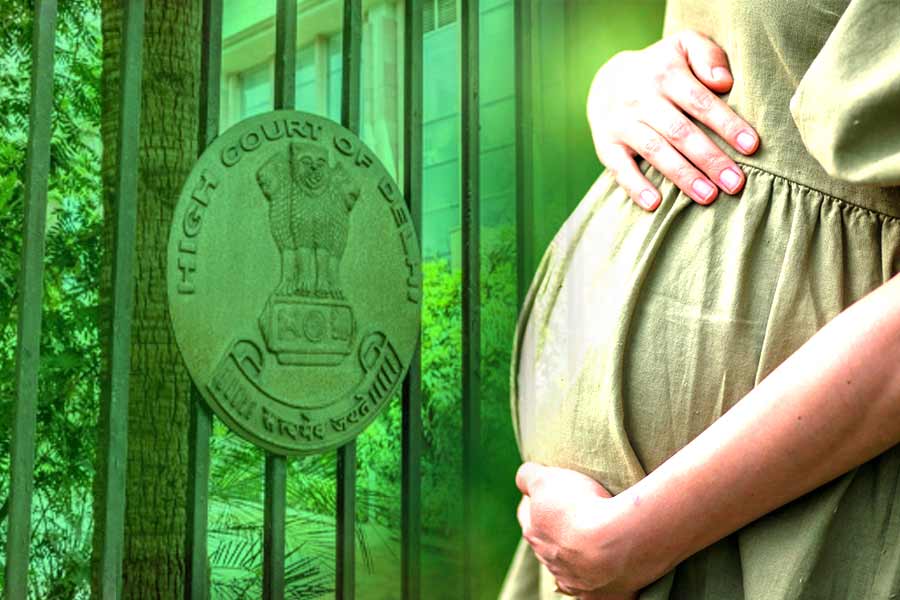The Delhi High Court has allowed a 31-year-old woman to undergo medical termination of her pregnancy of around 30 weeks after the foetus was found to have a neuro-developmental disorder.
The court, in an order passed on Friday, said the law ensures that women are not compelled to carry such pregnancies to term where the child would be born with severe abnormalities.
In view of a report given by a board of doctors from AIIMS, the court observed that the diagnosis indicated that the child, if born, would likely face severe neurological impairments and extensive health challenges on account of 'Joubert Syndrome'.
The court further noted that the first child of the petitioner woman also suffered from neurological handicaps and if the medical termination of pregnancy is not allowed in this case, "She and her family would be compelled to care for two children with significant neuro-developmental issues, requiring extensive, continuous, and advanced medical care potentially for their entire lives".
The burden of raising two children with severe disabilities in a household with limited financial resources is a daunting prospect that would likely lead to grave injury to the petitioner's mental health, it added.
"Considering the substantial risk of serious neurological difficulties and the adherence to the established medical guidelines, the court finds the recommendation of the AIIMS Medical Board to be well-founded in evidence and in the best interest of the Petitioner's health and the potential quality of life for the child. Petitioner is permitted to undergo medical termination of pregnancy at a medical facility of her choice," Justice Sanjeev Narula said in the order.
"The provisions of the (Medical Termination of Pregnancy) Act, read in harmony with the principles of personal liberty enshrined in the Constitution, affirm the right of a pregnant woman to seek a termination of pregnancy under medically justified circumstances.
"This ensures that women are not compelled to carry pregnancies to term, in situations where doing so would compromise their health or result in the birth of a child with severe abnormalities," the court stated.
It appreciated the AIIMS medical board for their assistance and said the doctors who contributed their opinions in this case shall have immunity in the event of any litigation arising out of this petition.
The petitioner, represented by lawyer Amit Mishra, approached the high court after the doctors at Lok Nayak Hospital, where she was being treated, denied her request to undergo medical termination of pregnancy (MTP) on June 13.
On June 24, the court first constituted a medical board comprising two doctors from Lok Nayak Hospital but on July 1, it constituted another board of doctors from AIIMS after the former's report was found to be "inconclusive".
Justice Narula, in the order, emphasised that the opinion of the medical board in cases of termination of pregnancy is of considerable importance for assisting the courts in arriving at a just order and medical professionals must offer their expert opinions without fear of legal repercussions.
The medical board at Lok Nayak Hospital, however, did not meet the court's expectations in the present case, Justice Narula observed, adding that in spite of the serious nature of the matter, it failed to conduct necessary tests and did not approach the issue with the required level of seriousness.
"When the court directed them to form a board, the subsequent report remained inadequate and lacked thorough testing and evaluation. The medical professionals play a crucial role in the society and it is not the intention of this Court to demoralize them, yet, it is imperative to highlight the significance of their responsibility in such sensitive matters," the court said.
Stating that the delay and inadequate counselling of the petitioner resulted in an advanced stage of pregnancy, the court advised the medical board of Lok Nayak Hospital "on the importance of their role and the critical impact their opinions have on the lives of the Petitioners and their families".
The court said the negative recommendation against termination of pregnancy by Lok Nayak Hospital was because of "inconclusive diagnosis" as they "relied upon old medical reports and scans without conducting further detailed tests".
"They have failed to provide a definitive diagnosis or fully assess the Petitioner's current condition. Conversely, the AIIMS Medical Board conducted comprehensive testing, including up-to-date ultrasound and fetal MRI scans, and arrived at a clear diagnosis of Joubert Syndrome," it said.
"The Medical Board at Lok Nayak Hospital has noted the fetal abnormality of Dandy-Walker Syndrome, a neurological malformation of the cranium, however, in absence of conclusive findings, they did not advocate MTP.
"On the other hand, the Medical Board at AIIMS has concluded that their findings were suggestive of Joubert Syndrome, a multisystem disorder with a poor neuro-developmental outcome and opined in favour of MTP," the court said.
It also noted that while Lok Nayak Hospital reported the pregnancy as being over 32 weeks, the AIIMS, through a more recent ultrasound scan, determined the gestational period to be 30 weeks and four days.
Except for the headline, this story has not been edited by The Telegraph Online staff and has been published from a syndicated feed.











